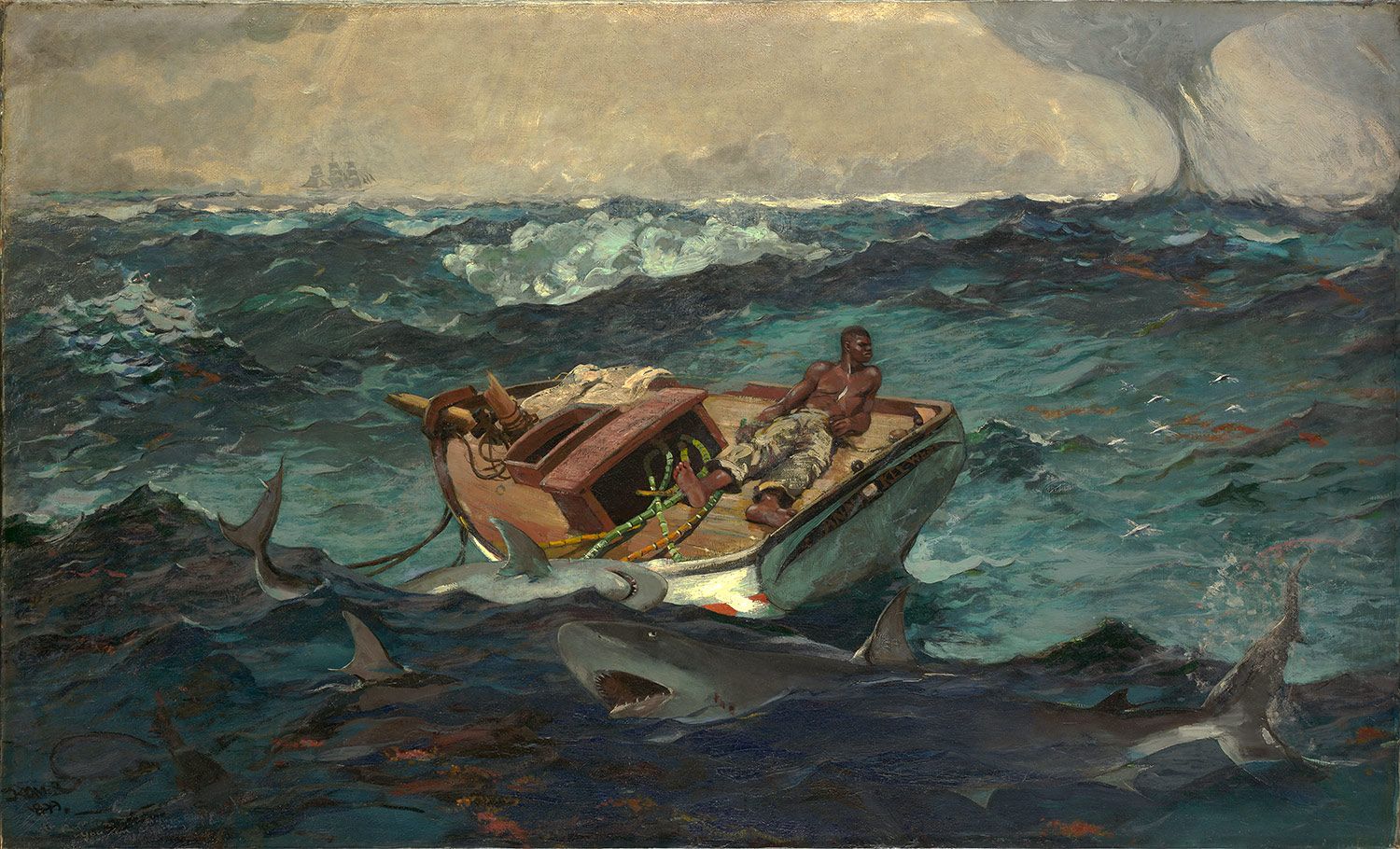
The Gulf Stream, Winslow Homer, 1899. Image courtesy of metmuseum.org
Hesiod’s Theogony starts off by telling where the story itself comes from: the muses teach Hesiod a song while he shepherds his lambs. His poems are created by the divine. They’re passed on by the voice of a goddess as it takes over his lungs.
The Greek epics open with an invocation. Tell me, muse, of the ingenious hero. Sing, muse, the wrath of Achilles, son of Peleus. Is it a plea or a command? But, either way, it says that inspiration comes from something else.
It comes through you, and your job is to get out of the way. You don’t lead it. You follow. So say the Greeks.
♠
I am eight and out on the wet dock. It is new summer and my bathing suit is clingy since I have been swimming, but I am too young to mind.
I am far out over the water.
The lake is a different color here, murkier than the roped-off part by the shore. The lifeguard peers at me but then a girl stops beside him and his attention wanders. I am unwatched. There are pitched calls and laughter back behind, but they fade out.
It comes up my spine, the need. It is not there and not there and then it is, it is coming through and I have stopped everything else. My neck thumps with pulse.
I jump. When I hit I slide through the water fast and the silt rises up everywhere like blood. I can’t see anything except the rushing.
I don’t know where the surface of the water is—I’m terrified.
♣
When I begin to read Marx I see it differently. The poetic conceit is a myth. It’s an idea created by a class of people who want to hoard the artistic means of production: that you can’t choose to make art, it chooses you. The people who hold cultural capital don’t like pop music, spoken word, stories with morals, because those forms try too hard. Because they’re not letting the muse run through them.
This is the ideology of an artistic class: that some other power controls who can make good art.
♥
It is the middle of April, past midnight, and I am walking toward the river. The rain keeps hitting me. I feel it in my skin. When I come to the Charles I stand by the water for a while. Then I cross the first bridge I come to.
It’s dark but lit bright at the far end, so I feel like I’m walking into some version of heaven where the rain is white. Somewhere in between I stop. The need comes again. Then my legs are dangling while I sit on the side of the bridge, watching the river come under like molten glass.
It’s a romanticized image—I want to wreck something.
A drunk guy staggers past, then another. The second one shouts, “Don’t jump, man, don’t jump.” I can’t tell if he is earnest or joking. He laughs a little, anyway.
There is a sense of vertigo. And it’s not so high, the shore is not so far, the water is deep enough here. I remember the wet dock and the absent lifeguard and the silt rushing to crowd the water. I remember the terror, realizing I was swimming downward. Trying to follow the bubbles because vision and touch and inner ear weren’t enough.
I don’t go any further. I just brace against the rain beating hard on my cheek.
♦
There is a particular form for nonfiction. A small anecdote is invested with meaning. This formula feels wrong: I have been told that that is not what art is. That art has no direction and no such clear meaning. That you cannot know where you are going when you start.
Once I went out to the ocean with my grandfather. His boat had a spherical compass perched in the deck, white arrows against a navy background. I stared at it while we got farther from the harbor. Then we couldn’t see land. The ocean surface was dark, which meant deep water, and there was nothing else.
I kept looking at the compass, but it didn’t mean anything. My grandfather had his hand on the tiller. The orb shifted around while the boat rocked and tacked. As night came on the sphere got filled with the dark, and the symbols glowed white against it.
I didn’t sleep much that night. Most of the time I still don’t. Sometimes right before I go to bed it’s a physical weight, the fear of orientation lost. Sometimes I walk by the water and the excitement of it is a siren calling me down. And sometimes I just am it, and this is my form.
